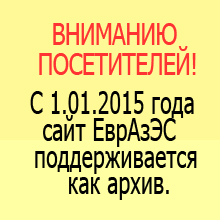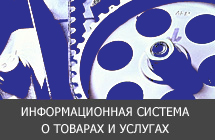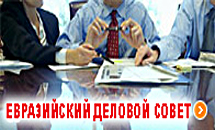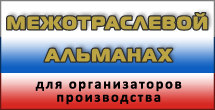|
REGULATIONS on Standing Committees of Inter-parliamentary Assembly, Eurasian Economic Community APPROVED by Resolution of the EurAsEC Inter-parliamentary Assembly 2 November 2002, No. 3–8
REGULATIONS on Standing Committees of Inter-parliamentary Assembly, Eurasian Economic Community (as amended on 30 May 2007)
Regulations on the Standing Committees of the Inter-parliamentary Assembly of the Eurasian Economic Community specify the objectives and procedures for setting up and operation of the Standing Committees of the Inter-parliamentary Assembly of the Eurasian Economic Community (hereinafter referred to as IPA, or the Assembly).
Chapter I. ORGANISATION OF COMMITTEES OPERATION
Article 1
1. For the purposes of drawing up and preliminary review of draft Fundamentals of legislation, standard drafts of legislative acts, and consideration of other issues, the Assembly sets up Standing Committees (hereinafter referred to as the Committees) consisting of Parliament Members representing parliaments of the member states of the Eurasian Economic Community (hereinafter referred to as EurAsEC, or the Community). 2. The number of the Committees, their names and competence (scope of activities) are approved by the Assembly in accordance with recommendations of the Assembly Bureau and with due account of proposals made by parliaments of the member states of the Community. 3. The Committees report and are held accountable to the Assembly.
Article 2
Work of the Committees are governed by the Treaty on the Establish-ment of the Eurasian Economic Community of October 10, 2001, as well as by Regulations on the Inter-parliamentary Assembly of the Eurasian Economic Community, Rules of the Inter-parliamentary Assembly of the Eurasian Economic Community, and the present Regulations.
Article 3
1. All members of the Committees have equal rights, and each member has a single vote. 2. If necessary, the powers of a Committee member may be transferred to another member of a national parliament.
Chapter II. Committees’ Competence ISSUES
Article 4
Acting within the scope of their competence, the Committees: – draw up and perform preliminary review of draft Fundamentals of the legislation framing basic legal relations, as well as draw up and perform preliminary review of drafts of standard legislative acts, drafts of applications, petitions, recommendations, proposals and other documents to be presented at the meetings of the Assembly and of the Assembly Bureau; – draft proposals and recommendations on harmonization (bringing closer together, unification) of legislation of the states – members of the Community, and bring the said legislation into conformity with the Treaties, Legislation, and other resolutions adopted by the Eurasian Economic Community with the purpose of effectuating the objectives of the Community; – organize and coordinate activities pertaining to comparative analysis of legislation of the member states; – counsel on documents and issues submitted to the Assembly for consideration and subsequently transferred to the Committees for preliminary study; – execute decrees and orders of the Assembly and of the Assembly Bureau; – participate in the organization of international theoretical and practical conferences, seminars and other events held by the Assembly; – interact with parliamentary committees and commissions of the states – members of the Community, of the Interparliamentary Assembly of the States – Members of the Commonwealth of Independent States, of the Belarus-Russia Union Parliamentary Assembly; with other international parliamentary organizations; with relevant bodies of the Community and the CIS, and with commissions and councils of the Integration Committee; – decide on issues pertaining to the organization and planning of their activities.
Chapter III. RIGHTS OF THE cOMMITTEES
Article 5
All Committees of the Assembly have equal rights.
Article 6
The Committees are entitled to: a) submit for consideration to the Assembly and the Assembly Bureau draft Fundamentals of Legislation, drafts of standard legislative acts, and other issues within the competence of the Committees; b) commission their members with presentation of individual or joint reports at the meetings of the Assembly and of the Assembly Bureau; c) hold joint meetings with other committees of the Assembly; d) invite scholars, specialists and experts to draw up and revise draft Fundamentals of Legislation, drafts of standard legislative acts and to make proposals with regard to setting up working groups consisting of representatives of the Integration Committee, as well as of state organs, scientific and other institutions and organizations representing the states – members of the Community; e) submit for consideration to the Assembly and to the Assembly Bureau proposals on the organization of international conferences and seminars.
Article 7
Draft Fundamentals of Legislation are considered by the Committee in accordance with procedures specified by the Agreement on the Status of the Fundamentals for the Legislation of the Eurasian Economic Community, the Procedure of their Elaboration, Adoption and Implementation, of July 18, 2004.
Article 8
The Committee at its own discretion devises the procedures for submission of draft standard legislative acts to the Assembly for consideration. The procedures are devised in accordance with the legislation drafting plan taking into consideration the provisions of the Rules of the Interparliamentary Assembly of the Eurasian Economic Community and the Regulations on the Legal Rules of the Interparliamentary Assembly of the Eurasian Economic Community.
Chapter IV. PROCEDURES REGULATING WORK OF THE COMMITTEES
Article 9
1. The meetings of the Committee are held at least twice a year. Usually, the Committee’s meeting shall be held at least one day before the meeting of the Bureau (Assembly). 2. The date and preliminary agenda for a regular meeting are normally set at the previous meeting of the Committee. 3. An extraordinary meeting of the Committee may be held by the Committee chairman after consultation with the Bureau or with the Chairman of the Assembly. 5. By way of exception, parliaments have the right to grant powers to their members enabling the said members to attend meetings of several Standing Committees of the Assembly.
Article 10
1. The meetings of the Committee are open meetings unless the Committee decides otherwise. 2. Members of the Assembly Bureau and the Executive Secretary of the Interparliamentary Assembly of the Eurasian Economic Community may take part in the work of the Committee. 3. Open meetings of the Committee may be attended by heads of the Community organs or persons duly authorized by them; representatives of state and administrative bodies of the member states; authorized representatives of states and international organizations which have observer status at the Assembly, and other representatives with sanction or upon invitation of the Committee or of the Committee Chairman. 4. With sanction or upon invitation of the Committee or of the Committee Chairman, the meetings of the Committee may be attended by representatives of mass media. 5. Members of the Assembly Secretariat and other persons are attend the meetings of the Committee in line with their duties concerning organization of the meeting or upon invitation of the Committee or of the Committee Chairman.
Article 11
1. Observers and invited persons do not interfere in the work of the Committee. They abstain from expressing their approval or disapproval and keep the established order. 2. The Chairman of the meeting may call upon observers or invited persons upon their request.
Article 12
1. The Chairman of the Committee, or in case of his/her absence, the Deputy Chairman of the Committee, is responsible for organizing the Committee’s work. The Chairman of the Committee and the Deputy Chairman of the Committee are elected from and by the Committee members by means of an open vote for the term of two years based on the rotation principle. A candidate is deemed elected if he/she receives the majority of the total votes cast by the Committee members. 2. Prior to the election of Chairman of the Committee and of the Deputy Chairman of the Committee, a meeting is chaired by the oldest member of the Committee. 3. The Chairman of the Committee retains his/her powers until the new Chairman is elected.
Article 13
The Chairman of the Committee: – presides over meetings of the Committee; – convenes meetings of the Committee; – organizes preparation of papers and draft documents pertaining to the meeting; – may invite to take part in the meetings of the Committee representatives of the Community bodies; representatives of state and administrative bodies of the Member States; representatives of other international organizations, as well as experts and specialists; – represents the Committee before the Assembly Bureau and other standing committees of the Assembly, as well as before the relevant state and administrative bodies of the Member States, international organizations, scientific institutions and non-governmental organizations; – organizes work pertaining to execution of the Committee’s orders; – notifies members of the Committee on the execution of orders and on the recommendations considered by the Committee; – signs the Committee’s resolutions.
Article 14
The Deputy Chairman of the Committee acts in line with distribution of functions. Provided the Chairman of the Committee is absent or cannot discharge his/her functions, the Chairman’s functions is discharged by the Deputy Chairman.
Article 15
The Secretary of the Committee is appointed at a meeting of the Committee. The Secretary of the Committee: – ensures preparation and distribution of papers and draft documents for a regular meeting, usually not later than one month before the date of the meeting; – provides organizational support for meetings of the Committee and of working groups set up by the Committee; – notifies the Assembly Secretariat and members of the Committee on the examination results and on the approval of draft documents; – executes the Committee’s resolutions and conducts clerical work for the Committee; – follows up timely forwarding of the Committee’s resolutions and recommendations to the executives and the executives’ replies; – receives and colligates information on execution of the Committee’s resolutions; – organizes information support for members of the Committee; – takes part in preparation and organization of international theoretical and practical conferences, seminars and other events held in accordance with the working schedules of the Assembly and the Committee; – enables interaction of the Committee with the state and administrative bodies of the Member States, international, scientific, and other organizations with the purpose of information exchange and meeting the objectives set before the Committee; – discharges other functions assigned to him by the Committee. Article 16
In case an issue is considered which is within the scope of responsibilities of two or more committees, joint meetings of the committees are held at the initiative of the Committee or of the Executive Secretary of the Assembly, or by order of the Assembly or of the Assembly Bureau.
Article 17
2. The chairman calls upon speakers according to the order in which they applied to speak. The chairman may reprove a speaker if the latter’s speech is irrelevant to the issue under discussion. 3. With the Committee’s consent, the chairman may restrict time accorded to speakers. 4. The chairman may accord precedence to other sitters to clarify submitted information or a proposed solution.
Article 18
Issues pertaining to the procedure shall have priority over other items on the agenda.
Article 19
The Russian language is the official language of the Committee, and all documents are expressed in Russian. A speech may be delivered in a language which is not the official language of the Committee. In such cases the speaker provides interpretation into the official language.
Chapter V. DECISION-MAKING
Article 20
At the Committee’s meetings resolutions are adopted which are signed by the Chairman of the Committee. Article 21
1. The Committee’s decisions on the issues within the scope of the Committee’s competence are adopted by a qualified majority constituting 2/3 of the total votes of the Committee members taking part in the meeting. In case the requirement of the 2/3 majority has been met but representatives of two parliamentary delegations have voted against the decision, the issue is referred for revision. 2. The Committee’s decisions on the procedural issues are adopted by an ordinary majority represented by votes of the Committee members taking part in the meeting. 3. Any parliament representative on the Committee may declare his/her disinterestedness in any issue. Such a declaration shall have no effect on the making of a decision, but shall be recorded in the minutes. 4. The Committee’s resolutions come into force as of the date of their adoption unless the resolutions specify otherwise.
Article 22
2. If necessary, the Committee meetings are written in shorthand or tape-recorded.
Article 23
Resolutions, minutes and other documents are kept in the Assembly’s archive.
Chapter VI. SUPPORT FOR THE COMMITTEE’S ACTIVITIES
Article 24
The Assembly Secretariat is responsible for providing information, legal, material and technical support for the Committee’s activities. __________
|
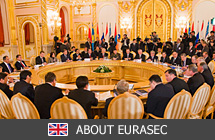
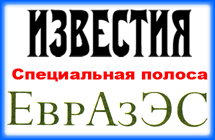
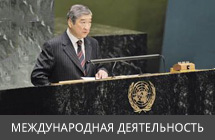
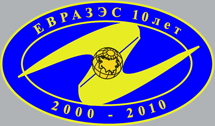
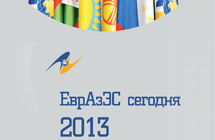
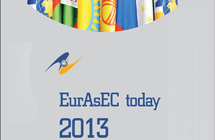
Поиск 10.10.2014 Заседание Межгосударственного совета ЕврАзЭС07.10.2014 Мультимедийная пресс-конференция в агентстве «Россия сегодня»03.10.2014 Встреча с Послом Финляндской Республики04.08.2014 Встреча Генерального секретаря ЕврАзЭС с Послом Республики Таджикистан20.06.2014 Премии Петербургского международного юридического форума «За вклад в развитие правовой интеграции на евразийском пространстве»28.05.2014 Договор о Евразийском экономическом союзе – важнейшее событие в новейшей истории наших стран25.05.2014 Презентация книги «Евразийский проект Нурсултана Назарбаева, воплощенный в жизнь. К 20-летию евразийского проекта 1994–2014»24.05.2014 VII АСТАНИНСКИЙ ЭКОНОМИЧЕСКИЙ ФОРУМ. Панельная сессия «Евразийской экономической интеграции – 20 лет. Итоги и перспективы»24.05.2014 VII Астанинский экономический форум и II Всемирная Антикризисная конференция, 21-23 мая 2014 года, Астана24.05.2014 Петербургский международный экономический форум, 23 – 24 мая 2014 года, Санкт-Петербург |

Евразийское экономическое сообщество
ЕврАзЭС
-
Страны участники
 Беларусь
Беларусь
-
 Казахстан
Казахстан
-
 Кыргызстан
Кыргызстан
-
 Россия
Россия
-
 Таджикистан
Таджикистан
-
 Узбекистан
Узбекистан
-
 Молдова
Молдова
-
 Украина
Украина



